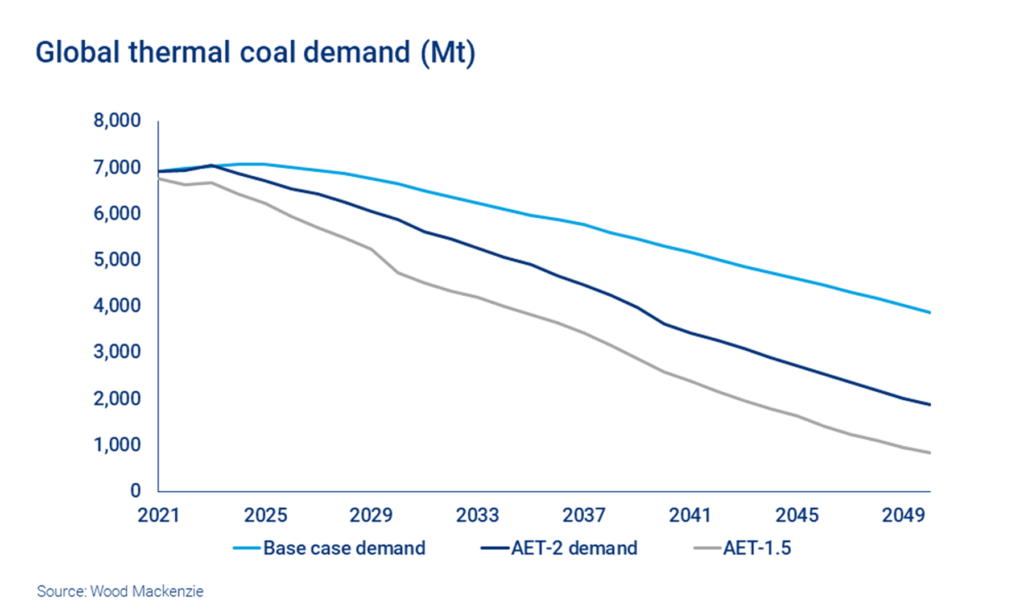In Kettle’s view, the scale of the challenge of such a dramatic reduction of coal demand should not be underestimated given the implications for electricity supply in an increasingly electrified world.

“The uncomfortable truth is that while coal is an unwelcome guest at the decarbonization table, we will still need coal-fired power to ensure an orderly transition to a low-carbon world,” he pointed out.
For the analyst, it is important to make a distinction between the different types of coal when advocating for a phase-down.
Kettle explained that coal burnt to produce electricity is thermal coal and it is the most widely used worldwide. However, there is another kind, metallurgical coal, which is used as a reductant in the production of iron from iron ore.
The analyst also pointed out that while the two intersect both on the supply and the demand side, as they are sometimes produced at the same mine and, at the margins, metallurgical coal can be used in power plants, there are two distinct markets.
“To many of, course, ‘coal is coal’ and to an extent, this is true, at least when viewing the impact on CO2 emissions. In this context, one of the four key goals of COP26 – to “accelerate the phase-out of coal” – is, of course, valid,” Kettle said.
Unclear objectives
For the WoodMac executive, however, there is a lack of implementation details on the Global Coal to Clean Power Transition Statement, which was signed at the COP26 by 52 nations, five sub-national and 26 other organizations, and which is supposed to be the roadmap to achieve the phasing-out objective.
In the Transition Statement, signatories committed, among other things, to a rapid scale-up of clean power generation and energy efficiency measures in their economies and support for other countries carrying out the same; a rapid scale-up of technologies and policies to achieve a transition away from unabated coal power generation in the 2030s for major economies and in the 2040s globally; to cease the issuance of new permits for new unabated coal-fired power generation projects, end new construction of unabated coal-fired power generation projects and end new direct government support for unabated international coal-fired power generation; and, to strengthen domestic and international efforts to provide a robust framework of financial, technical, and social support to affected workers, sectors and communities to make a just and inclusive transition away from unabated coal power in a way that benefits them and expands access to clean energy for all.
For the WoodMac executive, there is a lack of implementation details on the Global Coal to Clean Power Transition Statement
Besides the absence of instruction on how to achieve such goals, Kettle said that the signing of such a deal could be considered “something of a Pyrrhic victory against coal,” because none of the countries with the top three largest coal-fired power fleets – China, India and the US – are signatories.
“China, which possesses the largest coal-fired power plant capacity, has committed to peak carbon emissions, yet has made no firm commitment to reduce reliance on coal,” he said. “Meanwhile, in the US, President Joe Biden’s plan for a zero-carbon grid by 2035 arguably embraces the spirit of the COP26 text. However, the devil is in the detail and there are not inconsiderable political challenges; not the least of these is the possibility of a significant reversal in policy should the next presidential election be won by the Republicans.”
In his view, India was also late to the decarbonization pledge party but at least has committed to net neutrality by 2070. More urgently, it has pledged to reduce its projected carbon emissions by a billion tonnes, to 50% renewables share of power generation and to reduce the carbon intensity of its economy by 45% by 2030.
“That’s a tough ask for an economy projected to grow by 6-7% a year over the next decade,” Kettle said. “If the non-delivery against commitments made at COP Paris in 2015 is anything to go by, success by 2030 looks to be a long shot and is by no means guaranteed. To paraphrase Mark Twain who upon hearing rumours that he had in fact died was quoted as saying ‘the reports of my death are greatly exaggerated,’ I think the same can be said of coal!”



